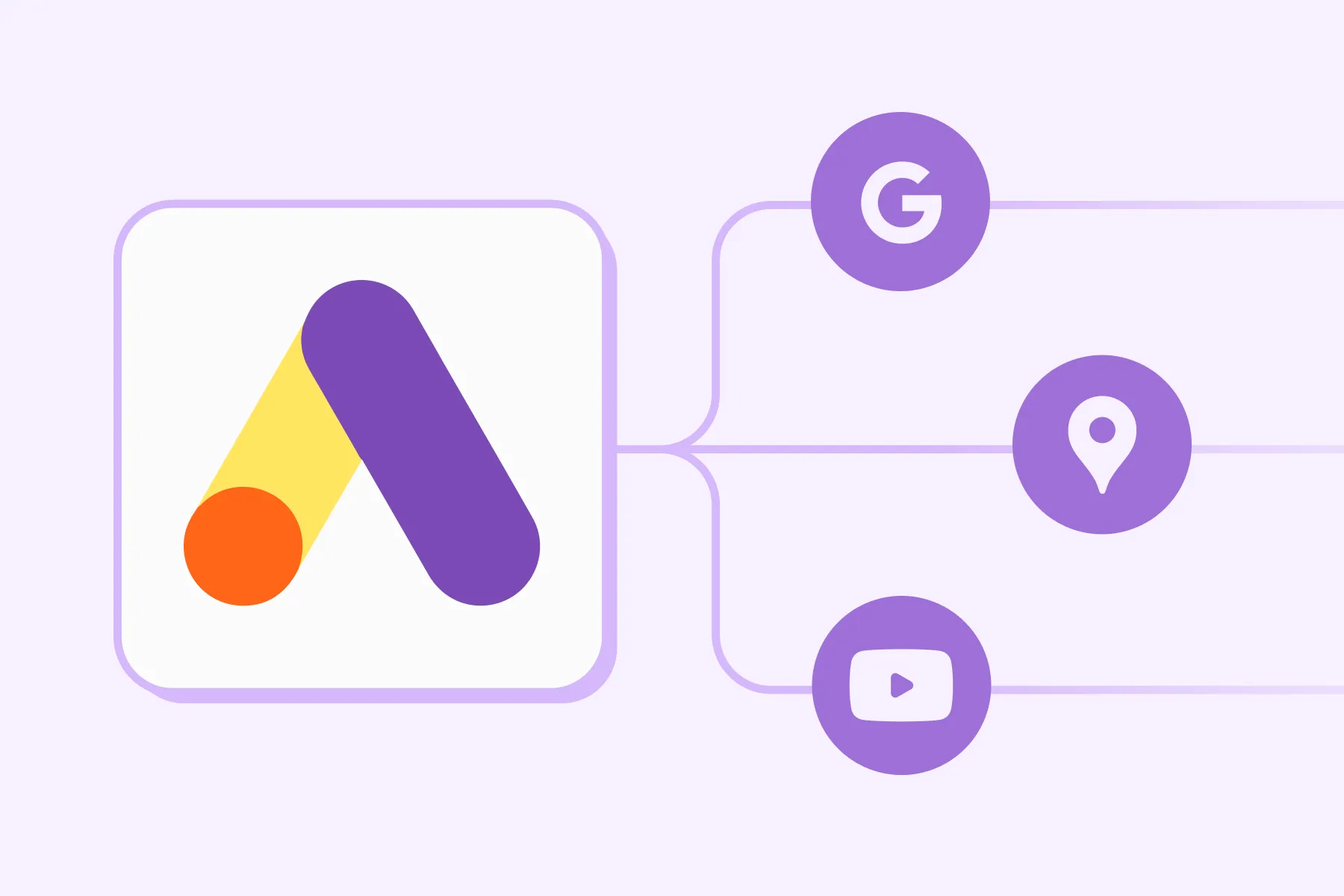Your Google Ads Account Needs a PPC Audit Yesterday
Anastasiya Khvin
September 8, 2025

We'll be brutally honest with you. If you haven't looked under the hood of your Google Ads account in the last three months, you're probably hemorrhaging money right now.
Last week, we were on a call with a SaaS founder spending $15K monthly on Google Ads. Then we asked him: "When did you last check your search terms report?"
Crickets.
Turns out, 30% of his budget was going to irrelevant searches. His campaigns triggered ads for "free accounting software" when his product costs $200/month. Another showed up for Excel template searches when he's selling enterprise automation.
That's $4,500 per month. Gone. For six months. This happens more than you'd think.
Why Your PPC Campaign Performance is Bleeding Money Right Now
After managing over $30M in PPC spend across hundreds of SaaS companies, we've learned something: the difference between a successful PPC campaign and a money pit often comes down to invisible infrastructure. The stuff happening behind the scenes while you're tweaking ad copy.
When did you last check if your conversion tracking actually works? Are you tracking the right events? Is your attribution model telling you which campaigns drive actual customers?
We once audited a B2B SaaS Google Ads account that looked healthy. Good CTR, decent conversion rates, management was happy. But when we dug deeper (and we mean really dug deep, like forensic accountant deep), we discovered their conversion tracking had been broken for three months. They were making decisions based on form submissions that weren't being recorded properly.
The scary part? They had no idea.
We see this constantly. Companies assume their tracking is fine because leads are coming in, but they're making decisions on incomplete data. Actually, as one of our team members puts it: "Marketing rarely fails because of low traffic. The real leak is often deeper in the funnel."
The Hidden Truth About Regular PPC Audits Every SaaS Company Ignores
Most SaaS founders treat PPC audits like dental cleanings. Something they know they should do but keep putting off until there's pain.
By the time you feel the pain, you've already lost serious money. You know what we mean?
When Was Your Last Full PPC Audit
If you're like most of the SaaS marketing managers we talk to, the answer is somewhere between "we looked at it last quarter" and "what exactly counts as an audit?"
What most people call a "PPC audit" is really just a performance review in disguise.
A proper PPC audit isn't checking your cost-per-click and calling it done. It's forensic investigation. Examining every campaign setting, checking audience targeting to see if you're reaching actual decision-makers, verifying if ad extensions pull their weight. Making sure your campaigns align with how customers actually buy.
The $30M Lesson From High-Growth Companies
Over the years, we've worked with companies like Mixpanel, ShipBob, and dozens of other high-growth SaaS brands. The ones that consistently outperform don't just run great campaigns. They audit obsessively.
Monthly deep-dives into PPC performance. Weekly search terms report checks. Daily conversion tracking monitoring. It sounds excessive until you realize a single missed negative keyword can cost thousands.
Companies that scale fastest treat their PPC account like mission-critical infrastructure. They're constantly questioning their data.
Take Demio. When they came to us, they were struggling with rising costs and declining lead quality. After our comprehensive PPC audit revealed structural issues, we increased their customers by 110% while cutting cost per acquisition by 24%.
Here's what we typically see in accounts before and after a comprehensive audit:
.webp)
PPC Audit Checklist to Save Your Ad Spend Today
Alright, let's get tactical. We're going to walk through this step-by-step. Fair warning: once you see what's happening in your account, you might lose sleep.
Honestly, some of the stuff we find makes us wonder how these companies were profitable at all.
Account Structure Deep Dive
Start with the foundation. Look at your campaign structure. Does it make sense? Are ad groups tightly themed, or do you have one giant ad group with 200 vaguely related keywords?
Quick test: can you explain your account structure in under two minutes? If not, your prospects can't figure out what you're selling.
We see this constantly. SaaS companies with campaign names like "Campaign 1" and ad groups mixing product keywords with competitor terms. Your google ads account should tell a clear story. If it doesn't, start there.
Conversion Tracking Validation
Open Google Analytics and cross-reference with your Google Ads conversion data. Do the numbers match? Are you tracking the right events?
Most SaaS companies either track everything (every page view, button click) or too little (just form submissions, no downstream reveneue tracking).
The sweet spot is tracking events that correlate with business outcomes: demo requests, trial signups, closed-won deals.
If you're not tracking revenue data in your PPC campaigns, you're flying blind. Cost per lead is interesting, but cost per customer matters for ROI.
This happened with Cloudvisor. Their tracking was recording leads, but they weren't measuring lead quality or downstream conversions. Once we implemented proper conversion tracking and segmentation, we were able to boost their pipeline quality by 130%.
Quality Score Analysis
Quality Score affects how much you pay and where ads show up. But it's not just about ads (it's about the entire user experience from search to conversion).
Google's Quality Score guidelines are pretty clear about this, but most people ignore the landing page component.
.webp)
Quality Score 1-4: Pay 100%+ more than baseline
Check Quality Scores at the keyword level. Anything below 7 costs money. Below 5 is lighting budget on fire.
Improving quality score isn't just tweaking ad copy. Sometimes your landing page is the problem. Sometimes keyword targeting is too broad.
We had a client bidding on "CRM" for their project managment tool. Quality Score was terrible, costs through the roof. When your ad copy talks about project management but your keyword is about customer relationship management, Google gets confused.And when Google gets confused, you pay more.
We see this disconnect frequently. Even the best ad campaign can't save a broken landing page or bad analytics. That's why our audit process always examines the full user journey, not just individual campaign elements.
Campaign-Level Warning Signs You Need to Audit Your PPC Account
Your cost per acquisition has been creeping up but you can't figure out why. Usually means something fundamental shifted (competitor activity, targeting drift, algorithm changes).
Your conversion rates are solid but lead quality fell off a cliff. You're attracting clicks from the wrong audience.
You're getting clicks and decent conversion rates, but your sales team asks where good leads went. Your campaigns target the wrong conversion event.
Branded campaigns perform well but non-branded struggles. You're not reaching new audiences effectively.
We helped Originality.AI tackle this. Their branded campaigns were great, but they struggled expanding beyond existing audiences. Through landing page analysis and conversion rate work, we increased their Google Ads sales by 100%.
The Keyword Graveyard How Negative Keyword Lists Transform ROI
We audited a project management SaaS spending $20K monthly. They couldn't understand why cost per lead kept climbing. Five minutes into the search terms report, we found the problem: showing up for "free project management," "project management templates," "how to manage projects without software."
Watching money flush down the drain in real time.
Match Type Disasters Killing Your Budget
Using broad match keywords without proper negative keyword coverage is like leaving your front door wide open.
Your "marketing automation software" keyword might trigger ads for "marketing automation definition" or "free marketing automation templates."
None of those searches are from people ready to buy software. All cost money.
Build comprehensive negative keyword lists that block irrelevant traffic before it costs money. Think firewall for your ad spend.
Search Terms Report Analysis That Actually Matters
Your search terms report is your bank statement for PPC. Shows exactly where money goes.
Export 30 days of data, sort by cost, look at your top 50 most expensive search terms. How many are actually relevant? How many represent realistic customers?
You can find detailed instructions on accessing this report in Google's official documentation, but honestly, most people never look at it.
Do the same sorted by impressions. You might find you're showing up thousands of times for searches that will never convert.
One client showed up for "free CRM" searches when their cheapest plan was $99/month. They'd been doing this for eight months. Eight months of paying for clicks from people explicitly looking for free solutions. You know what's crazy? They had no idea this was happening.
This waste is what we uncovered with ReliableSite. After implementing proper negative keyword strategies, we grew non-branded purchases by 4x while cutting branded campaign spend by 64%.
Ad Copy and Landing Page Relevance The Conversion Rate Connection
We see this constantly: ad copy promising one thing, landing pages delivering another. Or generic landing pages trying to be everything to everyone.
Click through your own ads as a prospect. Does the experience make sense? Does the landing page deliver on the ad promise?
If not, you found your problem. Like promising a cheeseburger and serving salad.
For DentalSave, a simple homepage A/B test led to 221% increase in click-through rate and 13% rise in conversions. Sometimes smallest changes produce biggest results.
Bid Strategy Analysis Beyond Automated Bidding
Google wants you using automated bidding. For many campaigns, it works great.
But automated bidding is only as good as the data you feed it. If conversion tracking is wonky, if you're tracking the wrong events, if campaign structure is messy, automated bidding makes bad decisons more efficiently.
Manual vs Smart Bidding Performance Analysis
We look at performance over time for inflection points. When did costs rise? When did lead quality decline? Often corresponds to bid strategy changes.
Smart bidding works with consistent conversion volume and clean data. For smaller SaaS companies with limited conversion volume or complex B2B sales, manual bidding might give better control.
For Propello, we implemented hyper-targeted campaigns using manual and smart bidding based on audience segments. Result: 235% increase in signups, significant decrease in Meta's CPA.
Free PPC Audit Tools vs Professional Audit Services
Can you use free tools to audit your PPC account?
Sort of. There are tools like WordStream's free Google Ads Performance Grader and SEMrush's PPC Audit tool that catch obvious problems (high cost keywords with low conversion rates, ad groups with too many keywords).
But they can't understand business context. Can't tell if campaigns align with go-to-market strategy. Can't identify opportunities specific to your market.
What DIY Audit Templates Miss
Most PPC audit templates focus on technical details (quality scores, CTRs, conversion rates). Fine for obvious problems, but misses strategic issues with biggest performance impact.
Are you targeting the right persona at the right buying journey stage? Are campaigns structured to match how customers research and buy? Are you measuring metrics that matter for your business?
These are strategic questions requiring understanding of PPC mechanics and your specific business model.
Why PPC Audit Reports from Agencies Outperform Internal Reviews
Look, we're obviously biased here since we're an agency. But external PPC audits catch things internal reviews miss.
Fresh eyes. Day-to-day campaign management creates blind spots. External auditors come without assumptions.
Comparative experience. We compare your account to others in your space. We know what good looks like for B2B SaaS, PLG companies, enterprise sales models.
No emotional attachment. Sometimes biggest problems stem from campaigns someone internally is invested in.
Our AI SEO tool client was attached to campaign structures that weren't performing. Our external audit identified issues. After implementing recommendations: 90% boost in paid subscriptions, 49% drop in CPA within one month.
The ROI Impact Before and After a Comprehensive PPC Audit
One B2B automation platform client spent $25K monthly with $180 cost per demo. After our audit and recommendations: $95 per demo while increasing demo volume 40%. That's extra $2.1M in pipeline annually from same ad spend.
Another HR tech client saw conversion rates jump from 2.1% to 4.3% just from fixing landing page alignment issues. No additional ad spend, no major campaign changes.
These weren't magic tricks. Systematic identification and fixing of problems hiding in plain sight.
For ShipBob, we achieved a 55% boost in conversions and 60% increase in qualified leads. The transformation came from addressing fundamental structural issues their internal team couldn't see.
You know what's interesting? HubSpot's research shows that businesses make an average of $2 for every $1 they spend on Google Ads, but we consistently see much higher returns when accounts are properly audited and structured.
How to Run a PPC Audit in Easy Steps (Without Breaking Your Campaigns)
Start with observation, not action. Before changing anything, understand what you have. Export data, take screenshots, document current setup.
Focus on biggest opportunities first. If 60% of budget goes to irrelevant keywords, fix that before ad copy testing.
Test changes incrementally. Don't overhaul everything at once.
PPC Audit Template and Process
Account structure review. Does organization make sense?
Conversion tracking verification. Tracking right events? Data accurate?
Keyword performance analysis. Which keywords drive valuable traffic? Which waste budget?
Search terms review. What searches trigger ads? How many irrelevant?
Ad copy and landing page connection. Does user experience flow logically?
Bid strategy assessment. Right bidding approach for each campaign type?
Budget allocation review. Spend distributed appropriately?
Metrics That Matter for SaaS Growth
Cost per qualified lead (leads that could become customers)
Lead-to-customer conversion rate by campaign (which campaigns drive quality vs quantity)
Customer lifetime value by traffic source (true campaign ROI)
Time to conversion (helps set attribution windows)
Pipeline velocity impact (PPC leads vs other channels)
These metrics tell the real story of PPC performance.
We help our clients set up proper analytics and tracking to measure these downstream metrics. It's part of our comprehensive approach that looks beyond just ad performance to actual business impact.
Tools like Google Tag Manager and Google Analytics 4 make this easier than ever, but most companies still get it wrong.
When to Perform a PPC Audit and Why Timing is Everything
Most companies audit reactively (when performance drops, costs spike, CEO asks uncomfortable questions).
Smart companies audit proactively. We recommend comprehensive audits every six months, lighter monthly reviews.
Certain triggers should prompt immediate audits:
Major competitive landscape changes Product or pricing changes Major Google algorithm updates Business model or go-to-market strategy changes Sustained performance decline you can't explain
That founder we mentioned? After we fixed account structure and negative keyword issues, cost per lead dropped 42% within the first month. Same $15K spend, twice as many qualified leads.
Your Google Ads account doesn't have to be a black box consuming budget. With regular PPC audits, it becomes your most predictable customer acquisition channel.
The question isn't whether your account needs an audit. It's whether you'll address problems before or after they cost you months of wasted spend.
Ready to Stop the Money Leak in Your PPC Account?
Look, if you've made it this far, you probably recognize some of these issues in your own campaigns. The good news? Most of what's bleeding your budget can be fixed faster than you think.
At Aimers - SaaS PPC agency, we've been doing this long enough to spot problems other agencies miss. We've worked with companies spending anywhere from $3K to $50K+ monthly, and honestly, the issues are usually the same. Broken tracking. Terrible negative keyword lists. Campaigns that haven't been touched in months.
If you're spending more than $3K monthly on PPC and wondering where your budget is actually going, let's have a conversation. We'll take a look at your account (for free, obviously), show you exactly what's happening with your spend, and give you a clear roadmap for fixing it.
No sales pitch. No 47-slide presentation. Just straight talk about what's working, what isn't, and what you should do about it.
Book a short strategy call and let's see where your budget is really going.
FAQs
How long does a comprehensive PPC audit take?
What's included in your PPC audit report?
Do you audit accounts on platforms other than Google Ads?
How much does a PPC audit cost?
What happens after the audit if we don't want to work together?

February 3, 2026

February 2, 2026

July 10, 2024









